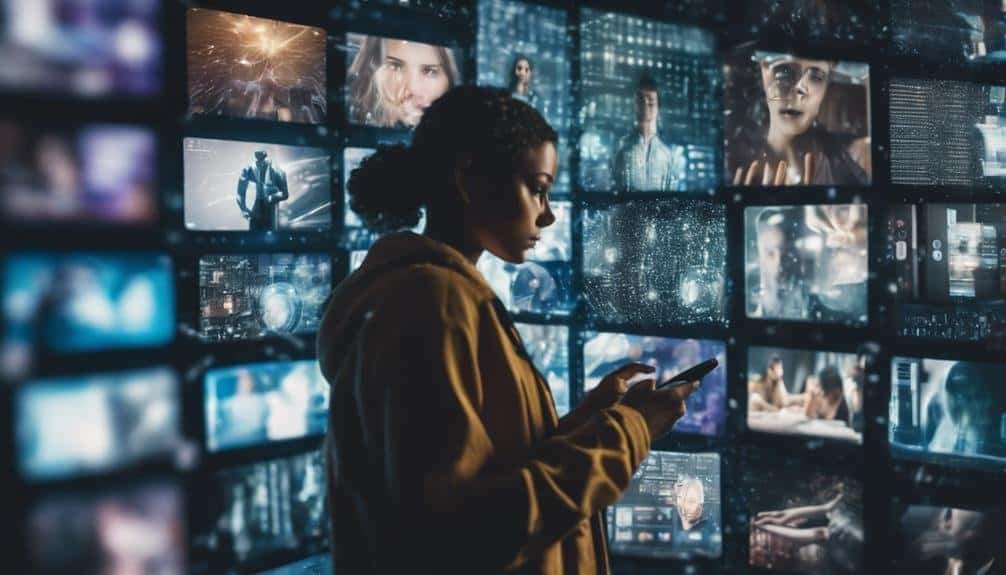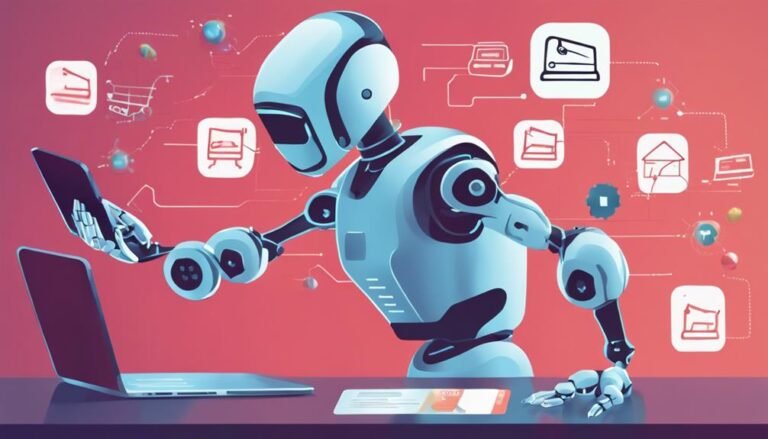The Impact of AI on Digital Literacy: A Practical Guide
Did you know that AI is not only transforming industries but also reshaping the landscape of digital literacy?
As technology continues to advance, understanding how AI impacts the way we consume and interact with information is becoming increasingly crucial.
From navigating the complexities of online disinformation to harnessing AI-powered tools for personal growth, this practical guide will equip you with essential skills to thrive in the digital age.
Explore the profound implications AI has on your digital literacy journey, and discover practical strategies to navigate this evolving landscape effectively.
Key Takeaways
- Understanding AI principles enhances digital literacy for effective technology navigation.
- Source credibility assessment is crucial for informed decision-making in AI environments.
- Critical thinking skills are essential for distinguishing reliable information from online disinformation.
- Embracing AI tools can enhance efficiency, productivity, and innovation in diverse areas of life.
Understanding AI and Digital Literacy
To comprehend the impact of artificial intelligence (AI) on digital literacy, it's crucial to first understand the fundamental concepts of AI and how they intersect with digital skills. AI applications encompass a wide range of technologies that simulate human intelligence processes, including machine learning, natural language processing, and computer vision. Developing digital literacy skills involves not only the ability to use digital tools but also to critically evaluate information and solve problems efficiently.
Understanding AI is vital as it increasingly shapes our digital experiences. AI applications power virtual assistants like Siri and Alexa, personalized recommendations on streaming platforms, and even autonomous vehicles. These technologies rely on complex algorithms that analyze vast amounts of data to make decisions or predictions. As such, having a grasp of AI principles can enhance your digital literacy skills by enabling you to navigate and leverage these technologies effectively in various aspects of your life. Stay tuned for further insights on how AI impacts digital literacy in the upcoming sections.
Enhancing Information Evaluation Skills
When evaluating information in the digital realm, it's crucial to hone your skills in assessing the credibility of your sources, recognizing biases that may be present, and mastering fact-checking techniques.
By actively engaging in source credibility assessment, bias recognition training, and fact-checking practices, you can navigate the vast sea of information with more confidence and accuracy.
These skills are essential in today's digital age to ensure that you're well-equipped to distinguish between reliable and misleading information.
Source Credibility Assessment
Enhancing your information evaluation skills through source credibility assessment is crucial in navigating the vast landscape of digital content influenced by AI.
Credibility assessment involves scrutinizing the reliability of the sources you encounter online. When evaluating a source, consider factors such as the author's expertise, the publication or website's reputation, and the presence of bias or agenda. Verify information by cross-referencing with multiple reputable sources before accepting it as true.
Be cautious of misinformation and always question content that seems dubious. Developing a critical eye for assessing source credibility not only enhances your digital literacy but also empowers you to make well-informed decisions in an AI-influenced information environment.
Bias Recognition Training
Developing a keen awareness of biases is essential for honing your information evaluation skills in the realm of Bias Recognition Training. In today's digital landscape, where AI algorithms curate much of the content you consume, understanding bias recognition and AI ethics is crucial. AI systems can unintentionally perpetuate biases present in the data they were trained on, leading to skewed information.
Fact-Checking Techniques
To enhance your information evaluation skills, mastering effective fact-checking techniques is crucial in navigating the vast sea of online information responsibly and ethically. Media literacy and critical analysis play key roles in this process.
When fact-checking, start by verifying the source of the information. Look for clues like the author's credibility, publication date, and supporting evidence. Cross-reference the information with reliable sources to ensure accuracy. Pay attention to any potential biases or agendas that may influence the presentation of facts.
Develop a habit of double-checking information before sharing it to prevent the spread of misinformation. By honing your fact-checking skills through media literacy and critical analysis, you can become a more discerning consumer and sharer of information in today's digital age.
Navigating Online Disinformation
When navigating online disinformation, spotting fake news and evaluating online sources are crucial skills to develop.
By being vigilant and questioning the credibility of information you come across, you can better protect yourself from falling for misleading content.
Learning to discern between trustworthy and unreliable sources will help you navigate the vast sea of information on the internet more effectively.
Spotting Fake News
Navigating online disinformation requires a keen eye for inconsistencies and a critical approach to evaluating sources. Identifying misinformation involves verifying information through reputable sources, cross-referencing details, and being cautious of sensationalized content.
Media literacy techniques play a crucial role in spotting fake news. When assessing news articles, scrutinize the publication's credibility, check the author's credentials, and look for supporting evidence. Be wary of clickbait headlines, misleading images, and out-of-context information. Additionally, consider the tone of the article and whether it aims to inform or persuade.
Evaluating Online Sources
Spotting fake news online demands a critical eye for inconsistencies and a vigilant approach to verifying sources, especially when it comes to evaluating online sources to navigate through disinformation. When identifying misinformation, remember to:
- Check the Source: Verify the credibility of the website or author.
- Cross-Reference Information: Compare the news with multiple reputable sources.
- Look for Biases: Be wary of overly sensationalized or emotionally charged content.
- Examine the Date: Ensure the information is current and not outdated.
- Fact-Check: Use fact-checking websites to confirm the accuracy of the news.
Engaging in critical analysis and applying these strategies will empower you to distinguish between reliable information and online disinformation effectively.
Developing Critical Thinking Abilities
To enhance your digital literacy in the age of AI, honing your critical thinking abilities is essential for navigating the vast sea of information online. Critical thinking involves analyzing information, assessing its credibility, and making informed judgments. In the digital landscape, where misinformation spreads rapidly, having strong critical thinking skills is crucial for distinguishing between reliable sources and fake news.
By developing your critical thinking skills, you can effectively evaluate the validity of online content, identify biases, and recognize logical fallacies. This ability to think critically not only enhances your problem-solving capabilities but also empowers you to make well-informed decisions in a world inundated with data.
To sharpen your critical thinking abilities, practice actively questioning information, verifying sources, and considering different perspectives before forming opinions. Engage in discussions, seek out diverse viewpoints, and be open to changing your stance based on new evidence. By honing your critical thinking skills, you equip yourself with the tools necessary to navigate the complexities of the digital age with confidence and discernment.
Embracing AI-Powered Tools
Enhancing your digital literacy through the development of critical thinking skills can seamlessly lead you to embrace AI-powered tools as invaluable resources in today's information-rich environment. As you navigate the realm of AI integration and technology adoption, consider the following:
- Efficiency: AI-powered tools streamline tasks, saving you time and effort.
- Accuracy: These tools offer precise data analysis, reducing errors and enhancing decision-making.
- Customization: AI adapts to your preferences, providing personalized recommendations and solutions.
- Automation: Tasks like scheduling, email responses, and data entry can be automated for increased productivity.
- Learning: Interacting with AI tools allows you to understand how they function and how they can benefit you.
Safeguarding Personal Data Online
To protect your personal data online effectively, implement robust security measures and stay informed about potential threats. Data protection and online privacy are crucial in today's digital landscape. Start by using strong, unique passwords for each online account and consider enabling two-factor authentication whenever possible.
Be cautious when sharing personal information on social media platforms and only provide necessary details on websites you trust. Regularly update your devices and software to patch any security vulnerabilities that could be exploited by cybercriminals.
Consider using a reputable virtual private network (VPN) when connecting to public Wi-Fi networks to encrypt your internet traffic and protect your data from potential snoopers. Be wary of phishing emails and messages that aim to trick you into revealing sensitive information.
Verify the authenticity of websites before entering personal data by checking for secure connections (https://) and looking for trust seals or privacy policies. By being proactive and vigilant, you can safeguard your personal data and preserve your online privacy effectively.
Fostering Digital Well-Being
Promote your digital well-being by setting boundaries and prioritizing mindful technology usage in your daily routines. Practicing digital mindfulness and ensuring online safety are crucial components of fostering a healthy relationship with technology. Here are some practical tips to help you achieve this:
- Establish Tech-Free Zones: Designate areas in your home where gadgets aren't allowed to promote face-to-face interactions and reduce screen time.
- Schedule Screen-Free Time: Allocate specific periods in your day to disconnect from devices and engage in offline activities to recharge your mind.
- Enable App Notifications Wisely: Selectively enable notifications only for essential apps to minimize distractions and stay focused on tasks.
- Regularly Update Privacy Settings: Periodically review and adjust privacy settings on your devices and accounts to safeguard your personal information.
- Educate Yourself on Cybersecurity: Stay informed about common online threats and best practices to protect yourself from cyber attacks and maintain online safety.
Cultivating Lifelong Learning Habits
Cultivating lifelong learning habits involves integrating continuous education and skill development into your daily routine to enhance personal growth and adaptability in an ever-evolving digital landscape. To cultivate curiosity, engage in activities that challenge your current knowledge and encourage exploration of new topics. Embrace self-directed learning by setting specific learning goals, seeking out relevant resources, and actively participating in educational opportunities that align with your interests.
Promoting self-directed learning involves taking ownership of your educational journey, allowing you to tailor learning experiences to your unique needs and preferences. Utilize online courses, webinars, podcasts, and other digital resources to expand your knowledge base. Embrace a growth mindset that values ongoing learning and views challenges as opportunities for development. By actively seeking out new information and skills, you can stay ahead in a rapidly changing technological landscape and equip yourself with the tools needed to thrive in the digital age. Cultivating lifelong learning habits not only fosters personal development but also enhances your ability to adapt to the ever-evolving demands of the digital world.
Conclusion
As you journey through the vast digital landscape, the impact of AI on digital literacy becomes clearer. Just as a skilled navigator uses tools to guide a ship through turbulent waters, you must enhance your information evaluation skills and critical thinking abilities to navigate online disinformation.
Embrace AI-powered tools like a compass, safeguard your personal data like a precious treasure, and cultivate lifelong learning habits like tending to a flourishing garden.
Stay vigilant, stay informed, and continue to grow in the digital age.







